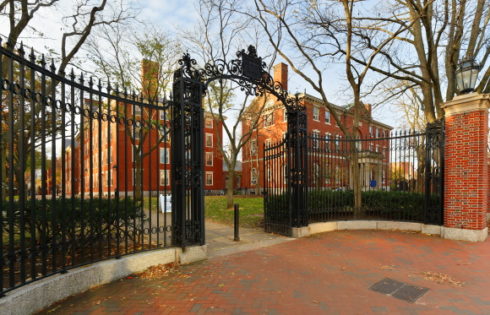
Texas seeks to ‘intervene’ in defense of Title IX regulation
Even when the Supreme Court conflated the social concept of “gender identity” with the biological reality of “sex” in the Bostock transgender employee case, it didn’t bother invoking Title IX.
The civil rights law only shows up in the dissent by Justice Samuel Alito, joined by Justice Clarence Thomas, who warned the majority’s decision would wreak havoc on Title IX by rendering meaningless the biological distinction between the sexes in athletic competition.
He noted that even “gender-fluid” students, who change their gender identities as often as they want without surgical or hormone treatment, would presumably be allowed to use whichever sex-segregated facility or program matches their “identity” that moment.
The Trump administration noted this when it compelled Franklin Pierce University last fall to get rid of its “Transgender Participation and Inclusion Policy,” which allowed biological males to participate in women’s sports.
“Even if Bostock applied to Title IX—a question the Supreme Court expressly declined to address—its reasoning would only confirm that Title IX does not permit a biologically male student to compete against females on a sex-segregated team or in a sex-segregated league,” the Department of Education said.
The new administration, however, is not tied down by fealty to objective definitions.
In the words of author Abigail Shrier, whose book “Irreversible Damage” catalogs the “transgender craze seducing our daughters,” President Biden has just imposed a “new glass ceiling” over the nation’s girls:
On day 1, Biden unilaterally eviscerates women’s sports. Any educational institution that receives federal funding must admit biologically-male athletes to women’s teams, women’s scholarships, etc.
MORE: University agrees to stop letting men compete against women in sports
On day 1, Biden unilaterally eviscerates women's sports. Any educational institution that receives federal funding must admit biologically-male athletes to women's teams, women's scholarships, etc.
A new glass ceiling was just placed over girls.https://t.co/cGWZqDpxl8
— Abigail Shrier (@AbigailShrier) January 21, 2021
The White House issued a sweeping executive order on the Democrat’s first day in office that presumes to end discrimination on the basis of gender identity or sexual orientation.
It takes a very different view of Bostock, claiming the “reasoning” of the Title VII (employment) decision was applicable to the very different sex-discrimination statute for federally funded education:
Under Bostock‘s reasoning, laws that prohibit sex discrimination — including Title IX of the Education Amendments of 1972, as amended … prohibit discrimination on the basis of gender identity or sexual orientation, so long as the laws do not contain sufficient indications to the contrary.
The word “transgender” – which is at heart of the dispute over women’s sports – only appears once in the order, unrelated to women’s sports:
Discrimination on the basis of gender identity or sexual orientation manifests differently for different individuals, and it often overlaps with other forms of prohibited discrimination, including discrimination on the basis of race or disability. For example, transgender Black Americans face unconscionably high levels of workplace discrimination, homelessness, and violence, including fatal violence.
While Title IX is also only mentioned in that one paragraph on the “reasoning” of Bostock, the order opens with the disputes implicating the law:
Every person should be treated with respect and dignity and should be able to live without fear, no matter who they are or whom they love. Children should be able to learn without worrying about whether they will be denied access to the restroom, the locker room, or school sports.
President Biden orders agency heads to review “all existing orders, regulations, guidance documents, policies, programs, or other agency actions” promulgated under sex-discrimination statutes, looking for materials that “may be inconsistent” with its sex-agnostic policy directive.
They are directed to consider revising, suspending or rescinding relevant agency actions, “as soon as practicable and as appropriate and consistent with applicable law, including the Administrative Procedure Act.”
(Using the APA would be novel for Biden, whose last administration flouted the notice-and-comment rulemaking process that is required to create new legally binding regulations. It relied on nonbinding guidance to threaten colleges that refused to drastically lower the evidence standard and eliminate the rights of accused students in sexual misconduct proceedings.)
Biden’s last administration put colleges ‘in a no-win situation’
The incoming administration’s predicted immediate reversal on Title IX led one state to seek to represent its own continuing interests in protecting the Trump administration’s Title IX regulation that restored basic fairness to sexual misconduct proceedings.
In a filing the day before inauguration, Texas Attorney General Ken Paxton asked a federal court to let it “intervene” in the case, since the Biden administration is “hostile” to the regulation, which went through an APA rulemaking.
It noted that Biden’s campaign website called the due process protections and procedural safeguards “a green light to ignore sexual violence” and promised to bring the regulation to a “quick end.”
Neither the Obama administration’s 2011 “Dear Colleague” letter, which first tried to enforce nonbinding guidance, and its 2014 “Questions and Answers” document, which infringed the First Amendment rights of students and faculty, went through a rulemaking, the Texas filing noted.
Yet they put colleges “in a no-win situation where either conforming or failing to conform to the guidance documents would expose them to significant risk of litigation.” Biden himself was the point man for these unlawful policies, developing and then announcing them, the AG said.
Its own six public university systems, recipients of vast federal funding, will be subject to paralyzing “uncertainty” about their Title IX obligations if the regulation, which took effect in August, is scrapped or left unenforced.
“Earlier guidance had caused a great deal of uncertainty regarding recipients’ legal responsibilities under Title IX,” the filing said. “Recipients did not know how to comply with the new mandates or whether failure to do so would incur legal consequences.”
As a result, many of them revised their policies “to cover a greater range of conduct” than might be required by the unlawful guidance “and make it easier for administrators to arrive at a determination of guilt”:
In short, earlier guidance put Texas institutions between a rock and a hard place. Not following the guidance would risk federal enforcement actions, but following the guidance would lead to lawsuits, litigation expenses, and ultimately monetary settlements. … The Final Rule, by contrast, resolves the dilemma. It provides clear guidance limiting Texas’ liability and reducing expected litigation expenses.
MORE: Yet another court tosses lawsuit to halt Title IX regulation
IMAGE: Ben Parker Photography/Shutterstock
Like The College Fix on Facebook / Follow us on Twitter







Please join the conversation about our stories on Facebook, Twitter, Instagram, Reddit, MeWe, Rumble, Gab, Minds and Gettr.